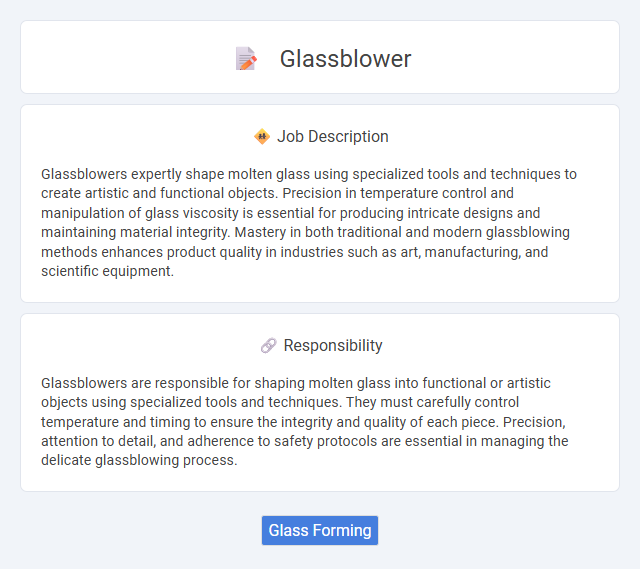
Glassblowers expertly shape molten glass using specialized tools and techniques to create artistic and functional objects. Precision in temperature control and manipulation of glass viscosity is essential for producing intricate designs and maintaining material integrity. Mastery in both traditional and modern glassblowing methods enhances product quality in industries such as art, manufacturing, and scientific equipment.
People with steady hands, good eyesight, and strong attention to detail are likely suitable for a glassblower job, given the precision required in shaping molten glass. Those with good physical stamina may find the job more manageable due to prolonged exposure to heat and the need for repetitive motions. Individuals prone to respiratory issues or with poor hand-eye coordination might face challenges in performing glassblowing tasks safely and effectively.
Qualification
Glassblower job requires specialized skills in shaping molten glass using tools and techniques such as blowing, molding, and cutting. Essential qualifications include proficiency in glass manipulation, knowledge of safety procedures, and experience with furnaces and kilns. Formal training or apprenticeships in glass artistry or industrial glassmaking often enhance employment opportunities and craftsmanship precision.
Responsibility
Glassblowers are responsible for shaping molten glass into functional or artistic objects using specialized tools and techniques. They must carefully control temperature and timing to ensure the integrity and quality of each piece. Precision, attention to detail, and adherence to safety protocols are essential in managing the delicate glassblowing process.
Benefit
Glassblowing may offer a high probability of developing advanced craftsmanship skills that are both unique and marketable. The job could provide opportunities for creative expression and potentially flexible working hours, allowing individuals to manage their time effectively. There is a likely benefit in terms of job satisfaction, as artisans often find value in producing tangible, beautiful works from raw materials.
Challenge
The glassblower job likely presents significant challenges due to the necessity of precise temperature control and manual dexterity required to shape molten glass. There is a strong probability that mastering complex techniques and maintaining safety in high-heat environments will demand extensive training and experience. Adapting to unpredictable glass behavior during the blowing process frequently tests problem-solving skills and patience.
Career Advancement
Glassblowers can advance their careers by mastering complex techniques such as lampworking and furnace operation, enhancing their craftsmanship and marketability. Experience in artistic design or industrial glass production often leads to supervisory roles or specialized positions in scientific glassblowing. Pursuing certifications or formal training programs further opens opportunities in bespoke glass art studios, manufacturing firms, and education sectors.
Key Terms
Glass Forming
Glass blowers specialize in the intricate process of glass forming, shaping molten glass into functional or artistic objects using a blowpipe and various tools. Precision in controlling temperature and timing is essential to achieve the desired glass thickness, texture, and form. Mastery of techniques such as blowing, molding, and annealing ensures durability and aesthetic quality in the final glass pieces.
 kuljobs.com
kuljobs.com